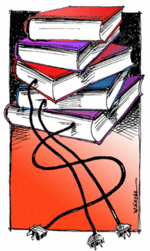
I noticed that my last string of posts revolve around video games, which would be a fairly one-dimensional account of all the media I love. I was thus pleased to see an article on the CBC about Alberto Manguel’s books A History of Reading and The Library at Night. Manguel uses the library to discuss the human urge to find meaning in chaos. He also admits to his ambivalence to the Internet, comparing it to a snack rather than the square meal that is the library, and notes that the Net doesn't encourage the type of musing that library reading does.
In my opinion, comparing the Internet and the library can only result in bellicose, circular contention. Thinking of them as companions in a modern academic environment is much more fruitful. Manguel notes that electronic databases can help readers gain access to esoteric or other kinds of works that are difficult to obtain. Not only that, in the process of my own research, I found that the Internet and Concordia's databases of journal articles allowed me to think and brainstorm through research.
In a way I am starting to personally believe Vannevar Bush's premise in "As We May Think". Written in 1945, Bush's article described the concept of the memex (short for memory extender) as an electronic link to a library that allows the reader to easily link and cross-reference associations made by texts. For example, in this blog, this article would have automatically displaying the CBC article, books review and perhaps a bio of Manguel, Concordia's library page, and the Atlantic Monthly archive with Bush's article and some criticism.
A regular library simply cannot do this, not without a few dozen library minions running around for you. But the memex or the modern equivalent shouldn't replace this bastion of peace and quiet, coffee-scented pages and microfilm machines. Instead, it can oriente and organize your library experience, leaving you more energy for your reading and taking some of the hassle out of your research.
I know some of my readers are neo-Luddites and avid bookophiles. What's your stance? Alternately, some of you people scream at the sight of a book. Do you love Wikipedia?


2 comments:
Wikipedia scares me... and while I don't really scream at the sight of a book, I've been on Sushi For Beginners for months now...
http://alamo.nmsu.edu/~jhaley/reading.htm -Book review
http://www.theatlantic.com/doc/194507/bush -Bush's article
http://library.concordia.ca -Concordia Library
Sorry, it seems i can't make the links clickable in the comments...
I prefer bibliophilia than bookophilia... and it is the proper term anyway. :)
I used to be a casual bibliophiliac, but my older sister (who slithered her way to work for Pinguin Putnam yet spends her weekends working for Barnes and Nobles so she can be surrounded by books 12/7) is a hardcore bibliophiliac bordering on bibliomania.
Wikipedia makes me fear myself. It's like a sea of links-upon-links-upon links. I've succumbed to a few hours (4-8 hours) of drowning in Wiki.
Though it is not the best source of detailed information regarding a certain subject. It is one of the best source for referrences and fundemental information on various subjects (think of it as an idiot's guide).
I usually use Wiki extensively for info on popular and modern visual culture. It's hard to depend too much on Wiki for other more serious or academic subjects because much of Wiki evolves around a collective opinion upon said subject and thus might not be the right kind of information that one need even with links to referrences and what-not.
That's not to say that libraries do not have their own faults. While the hard copies do have the detailed information, a problem that often realize is whether the libraries in which you have access to has stock of the books you need.
Ironically, that is where the internet excels as a source of information. The info might not be as detailed, but the basic info regarding that subject is available to everyone who seeks it.
Somewhere in between is of course referrence database existing within university libraries and other information agencies.
Ok... I've lost myself in thought again... :P
Post a Comment